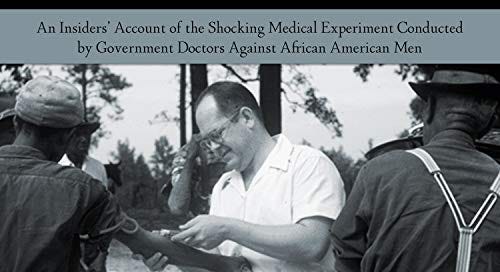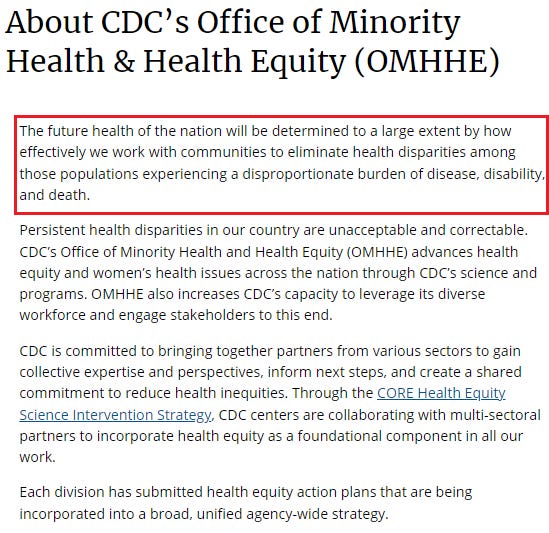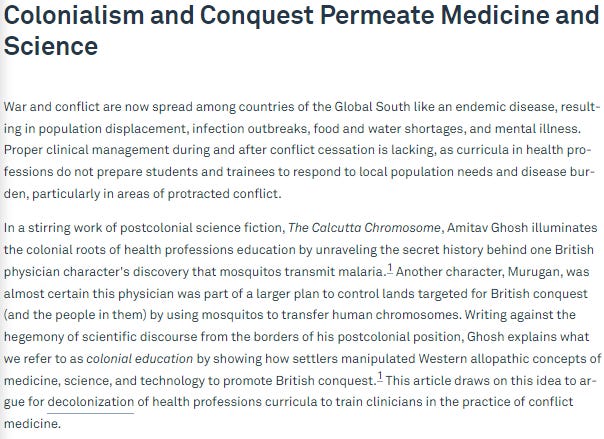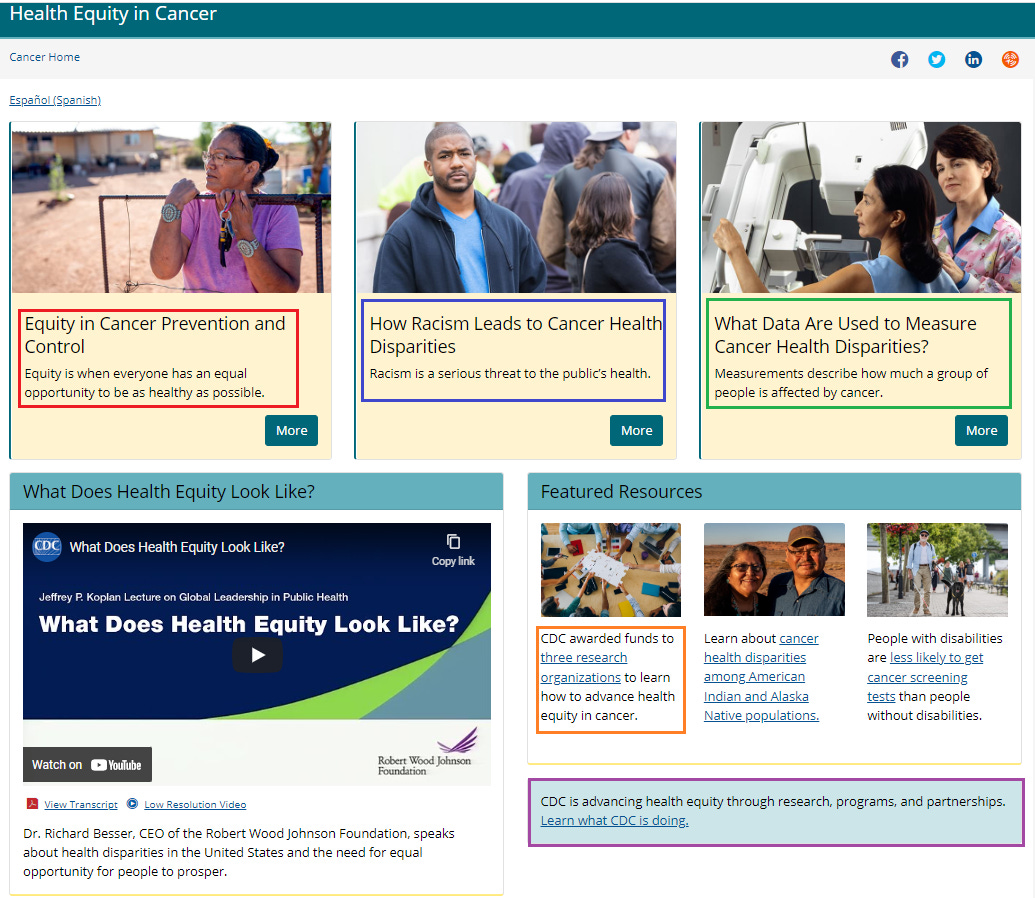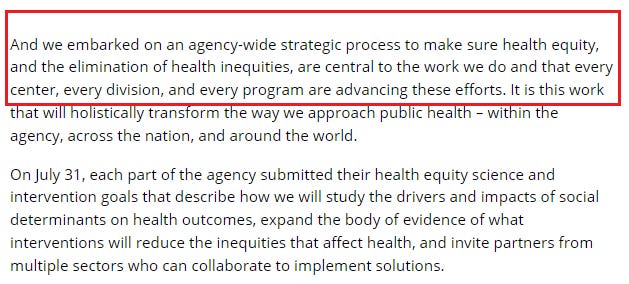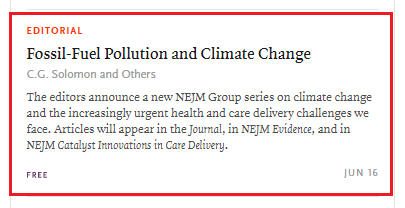The Political Weaponization of Medicine, Part IV: Medicalizing Racism
The CDC is the epitome of institutionalized racism
The Political Weaponization of the Medicine Full Article
The Political Weaponization of Medicine Part I: Introduction
The Political Weaponization of Medicine, Part II: Activists First, Doctors Second
The Political Weaponization of Medicine, Part III: Medicalizing Gun Control
The Political Weaponization of Medicine, Part V: Medicalizing Climate Change
The Political Weaponization of Medicine, Part VI: Unmitigated Academic Insanity
Refer to the earlier section on medical school curricula in Part II.
Racism Inside the CDC
(Yes, the CDC is blatantly racist, as we shall see.)
I am picking on the CDC because the CDC is representative of the medical community, is enormously influential on the academic world, publishes an enormous amount of material on their website that is easy to find and access, and is a particularly egregious violation of the officially non-partisan status of medicine.
Nestled within the CDC bureaucracy is a department called the “Office of Minority Health and Health Equity” (OMHHE). (We’ll get to what “Health Equity” means to signify later1.)
The OMHHE describes itself as follows:
There’s a lot to say about this (and the rest of the material on the webpage), but one thing is uniquely noteworthy is the boxed paragraph. The unmistakable but disturbing implication is that “eliminating health disparities” is as important a priority as anything else, and possibly the highest priority. This corrosive mindset has been born out in CDC’s own actions, as we shall see.
Let’s see what the OMHHE has been up to.
The OMHHE published a series of ‘CDC Health Disparities and Inequalities Reports’:
From the inaugural 2011 report:
The data presented throughout the report provide a compelling argument for action. Some articles identify promising programs and interventions that have been demonstrated to be effective in reducing the burden of disease or risk factors for a specific health problem. The report recommends addressing health disparities with dual intervention strategies related to health and social programs, and more broadly, access to economic, educational, employment, and housing opportunities.
This is thinly veiled political activism for very specific political agenda items that are controversial to say the least2.
Racism as a Public Health Issue
Racism is a political issue. Racism is not a medical issue.
But that’s not gonna stop the CDC, which has the following section on its website:
Impact of Racism on our Nation’s Health
To be fair, the CDC does have quite a bit of “personal experience” with institutional racism - the Tuskegee Experiment (officially “referred to” by the CDC as the “USPHS Syphilis Study at Tuskegee” - how sanitary) was a CDC atrocity, and a fairly recent one too.
Returning to the CDC’s webpage, they don’t waste any space getting to their thesis:
Racism, both structural and interpersonal, are fundamental causes of health inequities, health disparities and disease. The impact of these inequities on the health of Americans is severe, far-reaching, and unacceptable.
“Medicalizing” racism is incompatible with “politically neutral” medicine or “science”.
Medicalizing racism = the weaponization of medical institutions to enforce a particular political ideology, value system, and worldview on the rest of society.
There is a wealth of alarming, disturbing, and/or preposterous material parked within the CDC’s “Health Equity” section of their website for anyone curious to see for themselves.
Suffice it to say that it is hard indeed to distinguish the CDC from a typical political activist organization.
The CDC has a whole section dedicated to “Health Equity”, which we shall explore below.
Institutional Racism in the Medical Community
The following is a true story:
From the article:
The Journal of the American Medical Association’s editor-in-chief apologized on Thursday for a tweet and podcast from the publication that questioned the existence of systemic racism in health care.
Yup, he *questioned* the existence of systemic racism in healthcare. Oh, the HORROR.
The article continues:
“The language of the tweet, as well as portions of the podcast, do not reflect my commitment as editorial leader of JAMA and JAMA Network to call out and discuss the adverse effects of injustice, inequity, and racism in medicine and society as JAMA has done for many years. I take responsibility for these lapses and sincerely apologize for both the lapses and the harm caused by both the tweet and some aspects of the podcast,” Howard Bauchner, the journal’s editor, said in a statement.
If you think that this is over the top, consider what the CEO of the AMA had to say:
The CEO of the American Medical Association, James Madara, also issued a statement on Thursday to say he was “deeply disturbed” and “angered” by the podcast.
“The AMA’s House of Delegates passed policy stating that racism is structural, systemic, cultural, and interpersonal and we are deeply disturbed — and angered — by a recent JAMA podcast that questioned the existence of structural racism and the affiliated tweet that promoted the podcast,” Madara said. “JAMA has editorial independence from AMA, but this tweet and podcast are inconsistent with the policies and views of AMA and I’m concerned about and acknowledge the harms they have caused. Structural racism in health care and our society exists and it is incumbent on all of us to fix it.”
There are those pesky House of Delegates again.
It is worthwhile to consider what Mr. Madara is saying here: Since the AMA officially has a policy stating that “racism is structural, systemic, cultural, and interpersonal”, to so much as *question* the premise is beyond the pale.
Or in other words, the views of most of the country are too gouche to be countenanced in the halls of medicine.
The implications of this aggressive and far-reaching censorship and ideological zealotry are chilling.
In the end, Bauchner’s groveling apology was deemed insufficient to atone for his grievous infraction:
Oh, and the other doctor on that fateful podcast got canned as well:
And whaddya know? The Astroturf protest worked:
So let’s get this straight: The JAMA Editor-in-Chief articulated his personal opinion that doctors are not inherently racist mongrels and that there was not entrenched systemic racism in healthcare (a position in line with the vast majority of America). This was considered such an unforgivable heresy and threat - however unclear it is to most rational thinking people who exactly is facing such mortal peril - that JAMA not only fired someone with a remarkably distinguished career and sterling credentials, but they went and hired an open activist to replace him as the *Editor-in-Chief*. That’s right, a naked political zealot now runs the show over at JAMA.
This is completely insane. All because a couple off doctors had the temerity to state the obvious, that doctors by and large are not racist3.
The AMA in their Journal of Ethics (🤣🤣🤣🤣) have a study titled “Everyone Is Harmed When Clinicians Aren't Prepared”, where they inform us:
How anyone can rationally think that the medical community is not fatally compromised by their political activist dalliances is beyond me.
The Medical Literature’s Obsession with Race
There are literally hundreds and hundreds and hundreds of papers in the medical literature applying the core tenets of ‘Critical Race Theory’ to every nook and cranny of the medical universe.
I compiled about 30 studies with the abstracts here for those who want to see for themselves the full glory of the aforementioned cytokine storm of cray-cray:
I put the list without the abstracts in this footnote4.
These papers (along with the hundreds and hundreds of other similar studies) give the distinct impression that the medical community are SJW’s first and foremost, the dispensation of medical care and public health being a distant second.
JAMA’s new Editor-In-Chief
It is worthwhile exploring the academic history of the new head honchoette of JAMA, Dr. Kirsten Bibbins-Domingo, PhD, MD, MAS. (I think it’s about time ‘SJW’ was a credential, what are they waiting for already?) The scholar that Stat news glowingly referred to earlier as a “Black health-equity advocate”.
Following tradition, she wrote a piece introducing herself, and to lay out her vision for JAMA going forward:
The Urgency of Now and the Responsibility to Do More—My Commitment for JAMA and the JAMA Network
Here’s the abstract (unfortunately, the full text version is behind their paywall, and I’m not paying; various emphases mine):
Science, medicine, and public health are at extraordinary crossroads, crystalized by the pandemic. The contemporary investment in research has yielded unprecedented discoveries at an exceptional rate, establishing innovative tools and approaches that promise further insights to spur future progress. Faced with a novel virus devastating the planet, the scientific community moved with unparalleled speed to design effective diagnostic tests, vaccines, and therapeutics only to have their widespread adoption thwarted, in part, by confusion, poor communication, mistrust, *politicization*, and organized disinformation. The pandemic demonstrated local and global interconnectedness,
but also laid bare how entrenched social and structural inequities translate to catastrophic inequities in health.
The pandemic illustrated the way in which accessible high-quality medical care, functioning public health systems, and sensible policies must operate together to improve health—and often do not. Science, medicine, and public health have had brilliant triumphs, but have also been notably mired by inaction, lack of innovation, and failure to embrace much-needed transformative approaches. The urgency of now makes clear the compelling need to build on the successes forged by this crisis and engage in critical self-reflection to learn from shortfalls if the challenges of the ongoing pandemic and myriad health issues beyond COVID-19 are to be addressed.
I’m willing to bet that her fleshed-out explanation in the full article is far more disturbing.
(A search on the JAMA network of papers she is a credited author for reveals a skewed focus on racial social justice topics especially over the past few years.)
No serious healthcare professionals who understood their primary duty to society is to be dispassionate and neutral on all partisan matters would so much as contemplate inveighing upon the most divisive and emotionally fraught issues roiling society, let alone dispense with the pretense of objectivity altogether.
Health Equity
This topic merits its own section, as we shall soon appreciate.
But first we must understand: what exactly is ‘health equity’?
To remind everyone, “equity” is a political term of art that specifically refers to the UNequal treatment of people based on politically favored characteristics like race or gender in order to bring about equality in outcomes between all groups in society. It is an explicitly Marxist concept.
“Health Equity” is the application of equity to health, which is every bit as radical as it sounds5, and every bit as abhorrent in practice as one might fear.
For instance, the Wikipedia entry for ‘Health Equity’ informs us that “Inequity implies some kinds of social injustice.”
In the study Defining equity in health, we are similarly enlightened (in all caps too, although to be fair it is a section title) that “EQUITY MEANS SOCIAL JUSTICE”.
The study very explicitly makes clear what they mean:
EQUITY IS NOT THE SAME AS EQUALITY
The concept of equity is inherently normative—that is, value based; while equality is not necessarily so. Often, the term health inequalities is used as a synonym for health inequities, perhaps because inequity can have an accusatory, judgmental, or morally charged tone. However, it is important to recognise that, strictly speaking, these terms are not synonymous. The concept of health equity focuses attention on the distribution of resources and other processes that drive a particular kind of health inequality—that is, a systematic inequality in health (or in its social determinants) between more and less advantaged social groups, in other words, a health inequality that is unjust or unfair.
In other words, “Health Equity” means discrimination in practice - i.e. arbitrarily depriving some people of medical treatment or care - to eliminate gaps in health outcomes deemed unfair by radical partisan activists.
Literally:
This demented discrimination was indeed implemented:
Nestled deep within the article deceptively titled “With a record 9,813 new COVID-19 cases, Utah is limiting eligibility for monoclonal antibody treatments” is the statement, “[A] “risk calculator” that scores patients according to their risk of serious illness from COVID-19, with points given for age, sex, being part of a high-risk racial or ethnic group6, and certain medical conditions”.
In Minnesota, they use the “Ethical Framework for Allocation of Monoclonal Antibodies during the COVID-19 Pandemic”, which includes the following (Page 8):
Even Texas was not spared (#2 (!!) on the list):
We could go on and on here, but this should suffice to convey the demented ethical landscape of the medical community.
CDC & Health Equity
Unsurprisingly, the CDC has a heavily populated section on their website dedicated to health equity:
Don’t you love the propaganda picture of diverse smiling children? Subtle but powerful framing to get you to associate soft medical apartheid with happy good pleasantness.
The CDC is inviting us to “follow the links below”, so let’s.
We’ll explore one of them here (but I strongly encourage you to check out the rest yourself), “Health Equity in Cancer:”
This takes us to the following landing page:
We’ll analyze perhaps the most egregious of these: “How racism leads to cancer health disparities.” The CDC is openly declaring that racism is basically causing cancer. Oh, and “Racism is a serious threat to the public’s health.”
??!!!??!??!??!?!?!?!!?!?!?!
This gets MUCH worse. Clicking on that gets us to the following page. I encourage you to read through the entire CDC synopsis, however difficult and offensive it may be:
This is straight up catechistic CRT dogma. The same ideologically offensive brainwashing that parents across the country are demanding get thrown out of classrooms. To properly explain the content and implications of this to refute the numerous objections that some would raise requires its own article, but the wildly partisan character of this should be self-evident to any honest person.
The CDC maintains a radically different perspective, that systemic racism - a politically divisive fringe position claiming American society is irredeemably invested with and perpetuates racism - is a precipitating cause for cancer.
At the bottom of the page (not in the above screenshot) is the following:
More Information
These lead to further rabbit holes of endless inflammatory Marxist race-baiting rhetoric, that unfortunately I can’t cover because this article never end.
So we’ll conclude with the following “commentary” direct from Rochelle Walensky MD, MPH, Director, CDC, and Administrator, ATSDR:
It took her a mere 10 weeks to declare that “racism is a *serious* public health threat.”
It is worth emphasizing the sheer chutzpah of openly proclaiming the medicalization of racism.
A bit further on, she proudly announces that:
Take them at their word. EVERYTHING at the CDC has been infested with this partisan and offensive CRT claptrap.
And finally, she crows about the CDC’s achievement to successfully permeate every single nook and cranny and all those dark bureaucratic recesses nobody even knows exist:
“weave health equity into *EVERY* program at CDC”
Does “every” include those relating to covid??? This sure seems to be an open admission by the CDC that the CDC’s pandemic policies and guidance have had other objectives besides for just the “objective science.” (Judging by the content of their policy recommendations and guidance, one may wonder if Public Health was ever an objective at all.)
Again, I encourage you to go see the rest for yourself.
I don’t think there is anything I can add on top of this to better underscore the shocking weaponization of the CDC into on behalf of the CRT Mafia - which is an objectively accurate and factual characterization of the CDC derived from their own materials.
Except for one final outrageous act of sickening evil that is:
In a sickening irony, the CDC’s own prioritization scheme would lead to *more* deaths among minorities as well7, because black seniors were at far more risk than young healthy black healthcare or other so-called “critical” workers were, a point actually admitted to in the ACIP meeting.
In other words, achieving “equity” - reducing disparity of outcomes between blacks and whites - was worth a few thousand black lives as well.
The CDC folded under the withering public scrutiny that followed:
While the panel’s discussions were never formally offered as recommendations, public health experts who supported such a policy made their motivations publicly known.
“If we’re serious about valuing equity, we need to have that baked in early in the vaccination process,” Dr. Beth Bell, a CDC advisory committee panelist and professor of global health at the University of Washington, told The Washington Post.
“Older populations are whiter,” Dr. Harald Schmidt, professor of health policy and ethics at the University of Pennsylvania, told The New York Times. “Society is structured in a way that enables them to live longer. Instead of giving additional health benefits to those who already had more of them, we can start to level the playing field a bit.”
This is the demented face of “Health Equity.”
Lancet ‘Group for Racial Equality’
Special mention is due to The Lancet, which has gone above and beyond to create an Orwellian “Equity, diversity, and inclusion Collection” run by The Lancet’s equally ominous Group for Racial Equality. This is every bit as ghastly as it sounds. Here are a few of the 540 titles included in this special collection:
Will global health survive its decolonisation? (To be fair, Gates and his foundations should absolutely quit ‘health colonialization’ in Africa and Asia.)
Undoing supremacy in global health will require more than decolonisation
Racial microaggressions within respiratory and critical care medicine (I thought that killing the patient was a macro-aggression 🤔🤔🤔)
Ethnic and racial inequity and inequality in health and science: a call for action
The Lancet also has a “Racial Equality Advisory Board” to advise the Group for Racial Equality, which it describes as “an external international advisory board of leading multidisciplinary scholars and advocates for racial and ethnic equity”.
In other words, a collection of activists pushing some of the most controversial and polarizing ideological positions today.
NEJM Racism Collection
Not willing to be left behind, the NEJM has a section called “Race and Medicine,” which they describe as:
The Race and Medicine collection reflects NEJM’s commitment to understanding and combating racism as a public health and human rights crisis. Our commitment to antiracism includes efforts to educate the medical community about systemic racism, to support physicians and aspiring physicians who are Black, Indigenous, and people of color, and ultimately to improve the care and lives of patients who are Black, Indigenous, and people of color.
“Our commitment to antiracism”
Notice the expansive definition for what is included under “race and medicine:”
Yup, fossil-fuel pollution and climate change is a race issue. Which it absolutely is according to the modern tenets of intersectional theory:
George Floyd
We cannot avoid mentioning the aftermath of Floyd’s death, as it is a critical illustration of just how low medical science has stooped kneeling before the political golden calf of systemic racism.
What is relevant for us is not the incident itself, but the subsequent abrupt change in the pandemic “science”, and the statements issued by a variety of medical institutions & organizations, which anyone can find endless examples of by means of a quick Google search (fortunately for us, Google is proud of “antiracist” nurses).
This does not in any way diminish the grotesqueness or horror of his death, nor inveigh upon the associated moral quagmire8.
Overnight, pandemic guidance was changed from regarding 10-person outdoor funerals as unacceptably risky to hundreds of thousands tightly packed like sardines screaming at the top of their lungs being perfectly safe.
Well, almost perfectly safe. Fauci initially warned that “George Floyd protests provide ‘perfect recipe’ for new coronavirus surges. Well, for a brief while anyway, as the signature Fauci flip-flop did not take long to manifest, when Fauci under questioning from Rep Jim Jordan9 espoused an updated position that was both unclear and contradictory that seemed to boil down to the following two premises:
“Crowding together particularly when you’re not wearing a mask contributes to the spread of the virus.”
“I'm not in a position to determine what the government can do in a forceful way.” [re limiting Floyd protests]
Fauci’s inane and disingenuous responses also directly illustrate political considerations superseding what should have been a straightforward “yes, protests are liable to spread covid”10.
The Political Weaponization of the Medicine Full Article
The Political Weaponization of Medicine Part I: Introduction
The Political Weaponization of Medicine, Part II: Activists First, Doctors Second
The Political Weaponization of Medicine, Part III: Medicalizing Gun Control
The Political Weaponization of Medicine, Part V: Medicalizing Climate Change
The Political Weaponization of Medicine, Part VI: Unmitigated Academic Insanity
As far as I am concerned, “Equity” is an evil Marxist concept. Equity means to signify equality of outcome regardless of any other factors, which by necessity means unequal treatment that prejudicially favors some people over others by the law and by public policy.
I am personally working from the premise that the conventional academic wisdom regarding the extent of genuine racial/gender disparities and how best to alleviate them is dead wrong and moreover is often merely an attempt to masquerade a devious political agenda behind the moral veneer of fighting racism. Debunking what superficially appear to be factually based arguments on behalf of a just cause requires its own article (series of articles really).
Ironically, JAMA had commissioned a study published in 2008 that challenged “The American Medical Association was early and persistent in countenancing this racial segregation.”
African American Physicians and Organized Medicine, 1846-1968 Origins of a Racial Divide
The AMA formally apologized for their actual racist behavior throughout the century before the Civil Rights Era in 2008 on the basis of this study, as detailed by one of the study’s authors in an essay published in the NYT:
1. Whiteness is a Parasitic Disease
pubmed.ncbi.nlm.nih.gov/34039063/
2. The Role of Emotion in Understanding Whiteness
pubmed.ncbi.nlm.nih.gov/33415593/
3. The effects of whiteness on the health of whites in the USA
pubmed.ncbi.nlm.nih.gov/28716453/
4. Racism and Kidney Health: Turning Equity Into a Reality
pubmed.ncbi.nlm.nih.gov/33639186/
5. Visions by Women in Molecular Imaging Network: Antiracism and Allyship in Action
pubmed.ncbi.nlm.nih.gov/33754293/
6. White dominance in nursing education: A target for anti-racist efforts
pubmed.ncbi.nlm.nih.gov/32881135/
7. Rooting Out White Supremacy and Implementing Antiracism in Nursing Education
pubmed.ncbi.nlm.nih.gov/33574169/
8. Achieving Health Equity Through Eradicating Structural Racism in the United States: A Call to Action for Nursing Leadership
pubmed.ncbi.nlm.nih.gov/33002309/
9. Diversity, Equity, and Inclusion in Nursing: The Pathway to Excellence Framework Alignment
pubmed.ncbi.nlm.nih.gov/34469389/
10. Transformative dissonant encounters: Opportunities for cultivating antiracism in White nursing students
pubmed.ncbi.nlm.nih.gov/34350660/
11. How to Be An Antiracist Hand Surgery Educator
pubmed.ncbi.nlm.nih.gov/33762091/
12. From Diversity and Inclusion to Antiracism in Medical Training Institutions
pubmed.ncbi.nlm.nih.gov/33637659/
13. Academic Medicine's Journey Toward Racial Equity Must Be Grounded in History: Recommendations for Becoming an Antiracist Academic Medical Center
pubmed.ncbi.nlm.nih.gov/34432719/
14. Approaching the COVID-19 Pandemic Response With a Health Equity Lens: A Framework for Academic Health Systems
pubmed.ncbi.nlm.nih.gov/34705750/
15. Understanding Racism as a Historical Trauma That Remains Today: Implications for the Nursing Profession
pubmed.ncbi.nlm.nih.gov/33574167/
16. Entrenched White Supremacy in Nursing Education Administrative Structures
pubmed.ncbi.nlm.nih.gov/33574166/
17. A Nurse Educator's Perspective About Institutional Racism and White Supremacy in Nursing Education
pubmed.ncbi.nlm.nih.gov/33574170/
18. Professionalism: The Wrong Tool to Solve the Right Problem?
pubmed.ncbi.nlm.nih.gov/32134778/
19. Student-Led Efforts to Advance Anti-Racist Medical Education
pubmed.ncbi.nlm.nih.gov/33711839/
20.The White/Black hierarchy institutionalizes White supremacy in nursing and nursing leadership in the United States
pubmed.ncbi.nlm.nih.gov/33867099/
21. The lived experience of teaching about race in cultural nursing education
pubmed.ncbi.nlm.nih.gov/24682320/
22. Continuing the conversation in nursing on race and racism
pubmed.ncbi.nlm.nih.gov/23419839/
23. Pandemic racism – and the nursing response
ncbi.nlm.nih.gov/labs/pmc/artic…
24. Nursing's role in racism and African American women's health
pubmed.ncbi.nlm.nih.gov/10409989/
25. Something Old, Something New: The Syndemic of Racism and COVID-19 and Its Implications for Medical Education
journals.stfm.org/familymedicine…
26. Improving cross-cultural care and antiracism in nursing education: a literature review
pubmed.ncbi.nlm.nih.gov/19758731/
27. Weaving Antiracism Practice and Equity Into the Fabric of Cardiovascular Fellowship: A New Training Paradigm
pubmed.ncbi.nlm.nih.gov/34857097/
28. Promoting Diversity and Inclusion in Surgical Societies: Representation Matters
journals.lww.com/annalsofsurger…
29. The Ethical Imperative of Equity in Oncology: Lessons Learned From 2020 and a Path Forward
pubmed.ncbi.nlm.nih.gov/34061560/
30. Navigating inequities: a roadmap out of the pandemic
pubmed.ncbi.nlm.nih.gov/33479019/
31. Culture, Race, and Health: Implications for Racial Inequities and Population Health
pubmed.ncbi.nlm.nih.gov/31512293/
32. Making science and doing justice: The need to reframe research on racial inequities in oral health
pubmed.ncbi.nlm.nih.gov/33780174/
Here’s how ‘Equity’ is explained in the study:
Equity means social justice or fairness; it is an ethical concept, grounded in principles of distributive justice. Equity in health can be—and has widely been—defined as the absence of socially unjust or unfair health disparities. However, because social justice and fairness can be interpreted differently by different people in different settings, a definition is needed that can be operationalised based on measurable criteria.
For the purposes of operationalisation and measurement, equity in health can be defined as the absence of systematic disparities in health (or in the major social determinants of health) between social groups who have different levels of underlying social advantage/disadvantage—that is, different positions in a social hierarchy. Inequities in health systematically put groups of people who are already socially disadvantaged (for example, by virtue of being poor, female, and/or members of a disenfranchised racial, ethnic, or religious group) at further disadvantage with respect to their health; health is essential to wellbeing and to overcoming other effects of social disadvantage.
Health represents both physical and mental wellbeing, not just the absence of disease. Key social determinants of health include household living conditions, conditions in communities and workplaces, and health care, along with policies and programmes affecting any of these factors. Health care is a social determinant in so far as it is influenced by social policies; we use the term broadly here to refer not only to the receipt/utilisation of health services, but also to the allocation of health care resources, the financing of health care, and the quality of health care services.
Underlying social advantage or disadvantage refers to wealth, power, and/or prestige—that is, the attributes that define how people are grouped in social hierarchies. Disadvantage also can be thought of as deprivation, which can be absolute or relative; the concept of human poverty developed by the United Nations Development Program reflects severe disadvantage. Thus, more and less advantaged social groups are groups of people defined by differences that place them at different levels in a social hierarchy. Examples of more and less advantaged social groups include socioeconomic groups (typically defined by measures of income, economic assets, occupational class, and/or educational level), racial/ethnic or religious groups, or groups defined by gender, geography, age, disability, sexual orientation, and other characteristics relevant to the particular setting. This is not an exhaustive list, but social advantage is distributed along these lines virtually everywhere in the world. A health disparity must be systematically associated with social advantage, that is, the associations must be significant and frequent or persistent, not just occasional or random.
There are no independent risk factors associated with race that are not already accounted for by the medical factors in the same triaging manuals. This has been documented in medical literature, such as the NEJM study “Hospitalization and Mortality among Black Patients and White Patients with Covid-19” that reported:
CONCLUSIONS
In a large cohort in Louisiana, 76.9% of the patients who were hospitalized with Covid-19 and 70.6% of those who died were black, whereas blacks comprise only 31% of the Ochsner Health population. Black race was not associated with higher in-hospital mortality than white race, after adjustment for differences in sociodemographic and clinical characteristics on admission.
Thus the inclusion of ‘race’ lacks a coherent medical justification.
(For a basic overview, you can see:
Pursuant to their belief - which was widely believed at the time by most people - that the vaccines were indeed lifesaving.
For the record, Dr. Pierre Kory was commissioned to write an expert report on the physiological causes/chain of events leading to Floyd’s death. He determined -unequivocally - that he was killed by the policemen involved:
(This should also put to bed the asinine irruptions by the colorful assortment of fact-checking mongrels and media or medical miscreants against his credentials - there’s no way in a million years that the prosecutors chose a quack as their expert for the most prominent trial of the century.)
Fauci’s adroitly dodging and deflecting Jordan’s questions is a masterclass in political expertise, a subject for which Fauci is undisputedly a preeminent world expert. Here’s the transcript, judge for yourself:
FAUCI: Do protests increase the spread of the virus? I think I can make a general statement.
JORDAN: Half a million protesters on June 6 alone. I’m just asking, that number of people, does it increase the spread of the virus?
FAUCI: Crowding together particularly when you’re not wearing a mask contributes to the spread of the virus.
JORDAN: Should we limit the protesting?
FAUCI: I'm not sure what you mean. How do we say limit the protesting?
JORDAN: Should government limit the protesting?
FAUCI: I don't think that's relevant to--
JORDAN: You just said if it increases the spread of the virus. I'm just asking should we limit it?
FAUCI: I'm not in a position to determine what the government can do in a forceful way.
JORDAN: You make all kinds of recommendations. You make comments on dating, on baseball and everything you can imagine. You just said protests increases the spread. I’m just asking should we try to limit the protests?
FAUCI: I think I would leave that to people who have more of a position to do that. I can tell you--
JORDAN: The government’s stopping people from going to church, Dr. Fauci. Last week in the Calvary Chapel case, five liberals on the Supreme Court said it was okay for Nevada to limit church services. Justice Gorsuch said it best. He said there's no world in which the Constitution permits Nevada to favor Caesar's palace over Calvary Chapel. I’m just asking is there a world where the Constitution says you can favor one First Amendment liberty – protesting - over another - practicing your faith?
FAUCI: I'm not favoring anybody over anybody. I'm just making a statement that’s a broad statement that avoid crowds of any type no matter where you are, because that leads to the acquisition and transmission, and I don't judge one crowd versus another crowd. When you're in a crowd, particularly, if you’re not wearing a mask, that increases the spread.
JORDAN: It's a simple question, doctor. Should we limit the protests? Government is obviously limiting people going to church. Look, there’s been no violence that I can see at church. I haven't seen people during a church service go out and harm police officers or burn buildings, but we know for 63 days, nine weeks it’s been happening in Portland. One night in Chicago, 49 officers were injured, but no limit to protests, but you can't go to church on Sunday.
FAUCI: I don't know how many times I can answer that. I am not going to opine on limiting anything. I’m just going to tell you--
JORDAN: You've opined on a lot of things. This is something that directly impacts the spread of the virus and I'm asking your position on the protests.
FAUCI: I'm not going to opine on limiting anything. I'm telling you what is the danger, and you can make your own conclusion about that. You should stay away from crowds, no matter where the crowds are.
JORDAN: The government has stopped people from going to work. In fact, just in New Jersey four days ago, Ian Smith and Frank Trombetta were arrested for opening up, trying to operate their business, their gym. They were arrested. But my bet is if these two individuals who own this gym were outside just in front of their gym, and all the people who were working out in their gym were outside protesting, they’d have been just fine, but because they were in the gym working out, they got arrested. Do you think that's okay?
FAUCI: I’m not going to opine on who gets arrested and who does not. You get where I'm going? I'm telling you as a public health official I say crowds--
JORDAN: Do you see the inconsistency though, Dr. Fauci?
FAUCI: There’s no inconsistency, congressman.
JORDAN: So you're allowed to protest millions of people on one day in crowds, yelling and screaming but you try to run your business, you get arrested, and if you stood right outside that same business and protested, he wouldn't get arrested? You don’t see any inconsistency there?
FAUCI: I don't understand what you're asking me as a public health official to opine on who should get arrested or not. That's not my position.
JORDAN: You've advocated for certain businesses to be shut down. I'm just asking you to own your position on the protests. I haven't seen one -- we've heard a lot about hair salons but I haven't seen one hairstylist who between haircuts goes out and attacks police or sets something on fire, but we've seen all kinds of that stuff during protests. and we know the protests increase the spread of the virus. You said that.
FAUCI: I said crowds. I didn't say specifically. I didn't say protests do anything.
JORDAN: So the protests don't increase the spread of the virus?
FAUCI: I didn't say that. You're putting words in my mouth.
JORDAN: I just want an answer to the question. Do the protests increase the spread to the virus?
FAUCI: I don't have scientific evidence of anything. I can tell you that crowds are known, particularly when you don't have a mask to increase the acquisition and transmission. No matter what.
JORDAN: So you don't have a position on whether the protests increase the spread of the virus or don't increase the spread of the virus?
FAUCI: I am saying that crowds wherever the crowds are can give you an increased probability that there’s going to be acquisition and transmission.
JORDAN: But do you understand America's concern? Protesting, according to Democrats is just fine, but you can't go to work. You can't go to school. You can't go to church. There's limits placed on all three of those fundamental activities - First Amendment activities - but protesting is just fine.
Per their own conventional wisdom.

